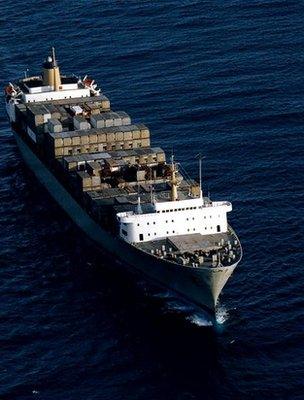Concern over 'high seas security loophole'
- Published

Large merchant freighters are fitted with systems that allow the vessel's movements to be tracked
All vessels using international waters should be identifiable and be part of a global tracking system to close a "security loophole" on the high seas.
The call was made by the Global Ocean Commission, an "independent high-level initiative on the future of the ocean".
The commission said current technology made the idea feasible and affordable.
At present, only passenger and large merchant vessels are legally required to have unique ID numbers and tracking devices.
Previous studies have highlighted a link between the lack of unique identification and tracking technology and criminal activity, such as people trafficking, illegal fishing and terrorism.
Officials investigating the 2008 Mumbai attacks in India, external, which left more than 160 people dead and injured hundreds more, said the attackers used a private fishing trawler to reach the Indian city after they overpowered the vessels' crew.
"In the 21st Century, when governments are doing so much to make their borders and citizens secure, it seems extraordinary that they have left a loophole big enough to sail a trawler full of explosives through," commented Jose Maria Figueres, one of the commissioners and former Costa Rican President.
"There are details to be worked though, such as the cost of tracking systems, although from the evidence we have heard so far we do not think that will be an obstacle."
He added: "For the security of citizens around the world, it seems clear that it is time to close the loophole."
Vessels can use a number of electronic systems for identification and communication, one of which is known as the Automatic Identification System (AIS).
AIS is a short-range system, using VHF radio. However, satellites in low-Earth orbit can also detect AIS signals, which provides real-time global coverage.
'Good guys' rewards
The commissioners said that many governments were taking steps to address the issue in their own waters but - they added - there had been very little progress to tackle the problem in waters outside of national jurisdiction.
Another commissioner and former UK Foreign Secretary David Miliband observed that legally requiring ID and real-time tracking of vessels using the high seas would also deliver other benefits, such as cracking down on human trafficking and illegal fishing opportunities.
"Mandatory vessel ID and tracking would reward those who play by the rules and penalise those who do not," Mr Miliband said.
"It would create economic opportunities for the 'good guys' and improve the social conditions of seafarers."
Writing in the journal Science in 2010, a study suggested that up to 26m tonnes of fish, worth an estimated $23bn (£16bn), were landed illegally each year.
Maritime law expert Richard Caddell said bolstering maritime security had become a priority for many nations, so the commission's call ought to be "relatively attractive".
"Vessels can be swiftly re-flagged and re-named so the [International Maritime Organization's] numbering programme provides a very effective means of tracking the precise history of a ship, which is very useful for both criminal investigations and enforcing civil claims against delinquent vessels," he told BBC News.
"Of the categories of vessels that are currently exempt from the numbering requirements, the fishing industry represents the biggest loophole."
But Dr Caddell - from the Institute of International Shipping and Trade Law, Swansea University, UK - warned that "maritime law enforcement remains a significant problem, especially in remote areas of the high seas in which it may be practically difficult to arrest the vessel"
He concluded: "While this is a laudable initiative, much will depend upon the ability of individual states to deal with these vessels on the ground."
The commission issued its recommendations for vessel monitoring at the end of a two-day meeting in New York and is expected to publish its final report in mid-2014.
- Published15 June 2012
- Published1 February 2011
- Published21 May 2010